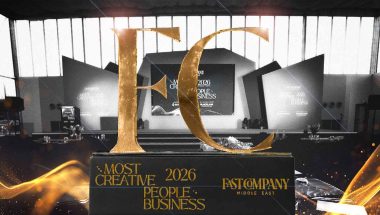- | 9:00 am
Business leaders in the Middle East need to make these changes in the workplace in 2024
Though the change is slow, many workplaces are now going beyond benefits and competitive compensation to actively create innovative cultures

Remember that scene in Jerry Maguire, after the sports agent played by Tom Cruise has been fired, and his colleague, played by Renée Zellweger, advises: “Momentum, forward momentum is all.” In those few words, she pretty much summed up the evolving world of work.
Workplaces are changing, no doubt. As employers push return-to-office mandates this year – the landscape will get a little more fractured – but how they craft such policies to include more flexibility to match a range of employee needs and preferences is something to watch out for.
To tap into the power of the workforce, organizations need to look at experiences and expectations. Daunting, no doubt, but the price of inaction is severe when you look at the forces at play.
Though the change is slow, many workplaces are going beyond benefits and competitive compensation — mere table stakes in a competitive talent marketplace — to actively create innovative cultures that employees value even more than money.
PRIORITIZING WELL-BEING
On the face of it, most of the claims about the changing workplace seem to be thin air, but it’s not.
“Prioritizing employee well-being is more than the latest corporate speak; it’s a compelling strategic imperative,” says Claudinia Harper, Director of People at TBWA\RAAD. “There is a growing evidence base documenting the causal link between improved employee well-being and improved motivation, productivity, innovation, and broader positive impacts on the bottom line.”
The workforce is stressed and overwhelmed, and as employee disengagement and turnover can cost a company millions in lost productivity annually, employee programs and well-being benefits must expand faster.
“Promoting the well-being of people is a worthwhile investment in many respects, as it is essential for both individuals and organizations,” says Ahmad Almusharraf, Head of People at KPMG Saudi and Levant.
“When people feel supported and valued by their employer, they experience job satisfaction, leading to reduced turnovers and a more positive work environment.”
Well-being enhances organizational culture, reputation, and legal compliance and creates a healthier, more engaged, and productive workforce, adds Almusharraf.
TBWA\RAAD has introduced flexibility options that support work-life balance and overall employee well-being, says Harper, investing in initiatives that safeguard talents’ crucial time for rest and renewal.
“We’re building a culture that fosters improved engagement and productivity, improving our processes and practices to ensure they support the health and happiness of our workforce to enable them to do their best work,” says Harper.
Alongside well-being, other key elements make a company a great workplace.
“A great workplace is defined by its culture, recognition of its people, and genuine investment in their growth,” says Hamda Al Shamali, Chief People and Intellectual Capital Officer at Mashreq. “We strive to create an atmosphere where our employees feel valued, motivated, and part of something larger than themselves.”
Al Shamali says an engaging work environment must bolster employee value propositions.
However, the statistics about employee engagement make for a grim reading, with more than two-thirds of employees feeling disengaged at work. Engagement is more than a paycheck – it’s about how companies motivate and reward employees in other ways.
Al Shamali says Mashreq has taken several steps to enhance this, including revamping the leave policy, creating a dynamic calendar of events, introducing perks that enrich employees’ lives, embracing a family inclusion concept, fostering a balance between personal and professional life.
FLEXIBILITY AND TRANSPARENCY
Flexibility is often cited as the biggest non-remuneration benefit possible, and this is only increasing since advancing women in the workplace is not a given, even in the 21st century.
Case in point: only about 47% of women are in the labor force worldwide compared to 72% of men in the global workforce, according to the International Labour Organization.
Providing flexibility and choice, skill and leadership development programs and a mission that aligns with their empowerment are gradually helping women stay in their jobs. Despite a few gains, work remains to be done to improve gender equity in the workplace.
To help women identify companies that serve their needs, make them feel inclusive, and prioritize their well-being, Fast Company Middle East launched the Best Workplaces for Women list.
“Fostering a supportive and inclusive culture where people are always placed at the forefront, ensuring their interest, inspiration, and involvement, and providing ample opportunities for growth and development is vital,” says Almusharraf.
Although the unemployment rate on average is 6% in the GCC countries, many workers can still afford to be choosy. And for many of them, company culture is likely important, especially as more and more employers are engaging in large-scale layoffs and requiring workers to return to offices.
While many things contribute to making a workplace great, according to Natasha Hatherall-Shawe, founder and CEO of TishTash, the Dubai-based communications agency that provides paid leave for fertility and menopause treatments, the best workplace is the one that treats “all as individuals and doesn’t adopt a one-approach-fits-all, taking the time to understand individual needs and offering flexibility and career paths based on everyone’s needs.”
“We have incentives regarding flexible working to enable women often serving as primary caregivers to their children to do school drop-offs and collection to more easily balance career and motherhood. We also have a 4.5-day working week, work-from-home policies, and work-from-home country for up to 4 weeks per year,” adds Hatherall-Shawe.
Implementing flexibility and myriad women’s health policies, TishTash is growing 50% revenue-wise YOY. “We have a happy and loyal workforce.”
But with the rise in flexible working, there’s a trust crisis in the workplace. The need to be seen working undermines autonomy. Working towards a trusting organization is the most effective attribute to support a healthy workforce, extending transparency and vulnerability.
According to Harper, a great workplace is distinguished by empathetic leadership, transparent communication, an “always-on” approach that ensures active listening to employee concerns, and continuous support.
“It should be infused with inclusive practices that celebrate diversity and foster a sense of belonging and connectivity among team members,” she adds. “Additionally, the company must cultivate an agile and adaptive environment that embraces change and encourages ongoing learning.”
EMPLOYEE EXPERIENCE
Recent reports have found that less than half of workers feel supported by their employers. They believe their companies don’t genuinely care about their well-being, and their total benefits just about meet their family’s needs.
Within this context, how do leaders transform their employee experience to improve mental health, increase productivity, and ensure their companies remain strong and grow?
According to Harper, to deliver a great employee experience, it is crucial to ensure that employees have access to the right tools, technologies, and assets essential for their roles, ensuring the various teams across the business are working towards a shared purpose, goals, and values.
“A workplace that fosters a sense of belonging enhances employee engagement, collaboration, and overall job satisfaction. Inclusion also includes equitable access to opportunities to grow professionally,” she adds.
To ensure an exceptional employee experience, creating a meaningful career journey for each employee with opportunities for growth and development is crucial, according to Al Shamali. “Also, cultivating trust in leadership through transparency and integrity, fostering a culture of mutual respect and collaboration.”
Apart from having suitable training opportunities, a clear progression path, and an appraisal system for employees to feel valued and engaged, Hatherall-Shawe says it is crucial to have “clear communication and listening to your staff and what it is that a) they need and b) want from their working environment.”
Lastly, Almusharraf adds, recognizing and celebrating the outstanding achievements of employees. “This will not only boost morale but also reinforce a positive work environment, driving motivation and commitment.”
In the modern workplace, all these forces are deeply interwoven. Crafting and managing the workplace requires a strategy, not just reactionary thinking. It may be a long road, but companies failing to start this journey will get left behind as the forces rumble on.







































